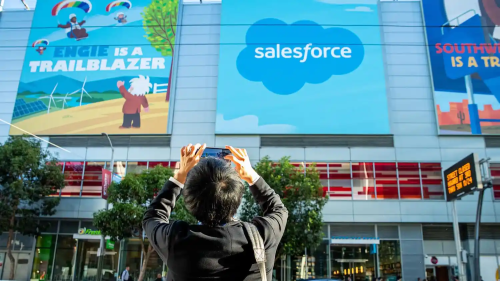With some of Silicon Valley’s splashiest startups making headlines because of their recent founder-CEO struggles, many are speculating about where things went wrong. Marc Benioff, CEO of CRM success story Salesforce, has his own opinions on what’s happening. In his mind, companies are staying private too long.
“I think a lot of private companies these days, we’re seeing governance issues all over the place,” Benioff said at a recent interview during TechCrunch’s Disrupt SF 2019 conference. He points to both WeWork and Uber as recent examples of companies that could have benefited from an oversight intervention that public investors could have provided.
WeWork’s CEO-founder Adam Neumann was ousted shortly after his investors balked and shelved the company's IPO indefinitely earlier this year. In 2017, Benchmark Capital – a widely respected Silicon Valley investment firm – pressured Uber’s founder, Travis Kalanick, into stepping down from his CEO position and subsequently sued him for allegedly misleading them into adding more board seats that operated under his influence.
Benioff shared his experiences with Salesforce as an example of when to IPO. “We went public, were $100 million in revenue [and] that was about the right time. We were small enough that we could make those changes and adjustments,” he said. “And there’s a lot of those that have to continually happen, and that includes the people on your team… who are really keeping you on the straight and narrow.”
Governance matters, he says, and those businesses who are ready to be accountable to a broader investor group will benefit from that scrutiny. The venture capital tech trend of late has largely been founder-friendly – leaving these people free to run their business without meddling investor-imposed rules and regulations mucking around in their vision. Founders guide the company to great success and investors reap the rewards.
The recent spate of CEO-founder failures to deliver – according to their investors – has led some to second-guess the whole strategy and Benioff is no exception. As far as his own experiences raising funds for Salesforce, he admits that he was turned down by every single VC in Silicon Valley. In the 1990s, it was the dawn of the internet as it's known today and cloud-computing wasn't even a twinkle in IT's eye. Consequently, his vision for the future was a tough sell to those pulling the purse strings.
“I had to go hat in hand, like I was a high-tech beggar, down to Silicon Valley to raise some money… And as I go from venture capitalist to venture capitalist to venture capitalist – and a lot of them are my friends, people I've gone to lunch with – and each and every one of them said no," Benioff said in a 2018 TechCrunch interview. "Salesforce was never able to raise a single dollar from a venture capitalist."
Benioff eventually raised $60 million from private individual investors before taking his company public in 2004. After his wild success with Salesforce, the larger-than-life CEO came up with the idea to put together his venture capital initiative in 2009 after the Great Recession made it difficult for small cloud companies to get their start.
“He kept hearing those stories of our partners having trouble raising money,” said John Somarjai, EVP of Salesforce Corporate Development. “It was so critically important for us to build this ecosystem around Salesforce, so he told me to start this program up and I was thrilled to do it.”
























